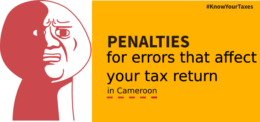What penalties do you pay if you file a tax return with errors, inaccuracies or inadequacies?
Getting your right tax has never been that easy. Any omissions, inadequacies or inaccuracies affecting the tax base can be easily picked up by the tax authorities. They have been trained to identify such errors or inadequacies. If such errors are discovered, you may have to pay extra or receive a penalty notification.
That is why it is important for an expert to help you determine whether your income, deductions and payments made are correct. The expert helps to ensure that the process goes as smooth as possible, as well as minimize the risk of you paying penalties.
If this article helped you, you can support our work at OpenHub.
Support OpenHub DigitalPenalties for filing an inadequate return
You can pay between 1.5% to maximum 50% interest in arrears per month where your return has errors that leads to an adjustment by the tax authority. The interest is calculated on the bases of expenses to be borne by the taxpayer following the notification issued after the last control.
The interest is calculated from the date the error or inaccuracy was deposited until the day the notification for adjustment was delivered.
An inaccuracy penalty is charged when you submit a tax return document with a mistake which results in you understating your tax liability. This mistake could be deliberate, careless or done deliberately and concealed.
In this case, the penalty is chargeable not only because of the mistake but because it resulted in you not paying enough tax on time due to your carelessness or because it was done deliberately.
The penalties are considered as ‘late payment’ of taxes. Negligence or ignorance is not considered when it comes to taxes. It rather indicates that you failed to take reasonable care.
- UBA Cameroon – Documents Required to Open a Bank Account
- Documents Required to Open a Bank Account in Cameroon (Companies, Associations and Individuals)
- The New “Simplified” Reality: Understanding the Comprehensive Tax (IGS) for 2026
- 2026 Tax Filing Deadlines in Cameroon: New Reporting Standards
- Taxation of Digital Services in Cameroon: The New 3% Rule (2026)
Additional penalties applied
The following penalties are applied in addition to the interest in arrears due to an inadequacy, omission or mistake made by the taxpayer:
- 30% in case of good faith (negligence or ignorance)
- 100% in case the tax authority discovers it was deliberately done (bad faith) by the taxpayer.
- 150% in case of fraud. Criminal proceedings may follow in this case.
Why is a penalty applied
The penalty is applied as a result of the adjustments or corrections made by the tax authority. The penalty is worked out as a percentage of the extra tax you have to pay (potential lost revenue) as a result of correcting the error, inadequacy or inaccuracy.
Next week, we will see what happens when a taxpayer fails to file a return.
Don’t hesitate to get in touch with us for any tax and accounting questions.
NB: This newsletter has been prepared for information purposes only. It is not intended to provide, and should not be relied on for, tax, accounting or legal advise. You need to consult your own tax, accounting or legal advisors before engaging in any transaction.
_ _ _ _ _ _ _ _ _
Frequently asked questions
How do I obtain a tax clearance certificate?
What income do I have to pay taxes on?
If this article helped you, you can support our work at OpenHub.
Support OpenHub DigitalWhat donations or gifts are tax-deductible in Cameroon?
What Happens When You Fail to File Monthly Return in Cameroon?
How to Obtain the Taxpayer Identification Number in Cameroon
How Long Should I Keep Records | Cameroon Tax Administration
What do I Need to Open a Business Account with in Cameroon
From Insight to Implementation
Going through the administrative and legal landscape in Cameroon requires more than just information—it requires a grounded local partner. At OpenHub Consulting, we specialize in helping the diaspora and international investors turn their business visions into compliant, operational realities.
If you are ready to move forward, our team is prepared to manage your registration and compliance from start to finish.
Start Your Company Incorporation →Discover more from OpenHub Digital
Subscribe to get the latest posts sent to your email.

